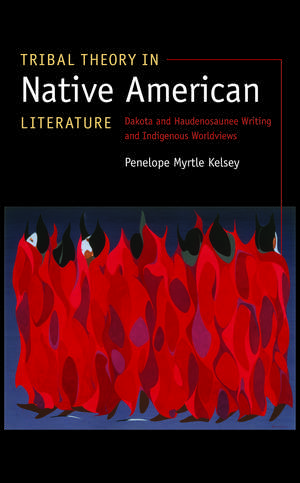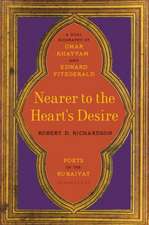Tribal Theory in Native American Literature: Dakota and Haudenosaunee Writing and Indigenous Worldviews
Autor Penelope Myrtle Kelseyen Limba Engleză Paperback – 2010
Scholars and readers continue to wrestle with how best to understand and appreciate the wealth of oral and written literatures created by the Native communities of North America. Are critical frameworks developed by non-Natives applicable across cultures, or do they reinforce colonialist power and perspectives? Is it appropriate and useful to downplay tribal differences and instead generalize about Native writing and storytelling as a whole?
Focusing on Dakota writers and storytellers, Seneca critic Penelope Myrtle Kelsey offers a penetrating assessment of theory and interpretation in indigenous literary criticism in the twenty-first century. Tribal Theory in Native American Literature delineates a method for formulating a Native-centered theory or, more specifically, a use of tribal languages and their concomitant knowledges to derive a worldview or an equivalent to Western theory that is emic to indigenous worldviews. These theoretical frameworks can then be deployed to create insightful readings of Native American texts. Kelsey demonstrates this approach with a fresh look at early Dakota writers, including Marie McLaughlin, Charles Eastman, and Zitkala-Ša and later storytellers such as Elizabeth Cook-Lynn, Ella Deloria, and Philip Red Eagle.
This book raises the provocative issue of how Native languages and knowledges were historically excluded from the study of Native American literature and how their encoding in early Native American texts destabilized colonial processes. Cogently argued and well researched, Tribal Theory in Native American Literature sets an agenda for indigenous literary criticism and invites scholars to confront the worlds behind the literatures that they analyze.
Preț: 176.26 lei
Nou
Puncte Express: 264
Preț estimativ în valută:
33.74€ • 36.66$ • 28.36£
33.74€ • 36.66$ • 28.36£
Carte tipărită la comandă
Livrare economică 21 aprilie-05 mai
Preluare comenzi: 021 569.72.76
Specificații
ISBN-13: 9780803232730
ISBN-10: 080323273X
Pagini: 192
Ilustrații: 7 photographs, table, index
Dimensiuni: 140 x 216 x 15 mm
Greutate: 0.25 kg
Editura: Nebraska Paperback
Colecția University of Nebraska Press
Locul publicării:United States
ISBN-10: 080323273X
Pagini: 192
Ilustrații: 7 photographs, table, index
Dimensiuni: 140 x 216 x 15 mm
Greutate: 0.25 kg
Editura: Nebraska Paperback
Colecția University of Nebraska Press
Locul publicării:United States
Notă biografică
Penelope Myrtle Kelsey is an assistant professor of English at Western Illinois University.
Cuprins
List of Illustrations
List of Tables
Acknowledgments
Author's Note
Introduction: Indigenous Knowledge as Tribal Theory
1. Pictographs and Politics in Marie McLaughlin's Myths and Legends of the Sioux: A Dakota Storyteller in the Oza<ND2> Tradition
2. Charles Eastman's Role in Native American Resistance Literature: A "Real Indian" to the Boy Scouts
3. Zitkala <SD1>a, Sentiment, and Tio<SD2>paye: Reading Dakota Rhetorics of Nation and Gender
4. Ella Deloria's Decolonizing Role as Camp Historian in Waterlily: Sisters, Brothers, and the Hakata Relationship
5. A Gendered Future: Wi and Ha<ND2>wi in Contemporary Dakota Writing 6. Tribal Theory Travels: Kanien'kehaka Poet Maurice Kenny and the Gantowisas
Notes
Bibliography
Index
List of Tables
Acknowledgments
Author's Note
Introduction: Indigenous Knowledge as Tribal Theory
1. Pictographs and Politics in Marie McLaughlin's Myths and Legends of the Sioux: A Dakota Storyteller in the Oza<ND2> Tradition
2. Charles Eastman's Role in Native American Resistance Literature: A "Real Indian" to the Boy Scouts
3. Zitkala <SD1>a, Sentiment, and Tio<SD2>paye: Reading Dakota Rhetorics of Nation and Gender
4. Ella Deloria's Decolonizing Role as Camp Historian in Waterlily: Sisters, Brothers, and the Hakata Relationship
5. A Gendered Future: Wi and Ha<ND2>wi in Contemporary Dakota Writing 6. Tribal Theory Travels: Kanien'kehaka Poet Maurice Kenny and the Gantowisas
Notes
Bibliography
Index
Recenzii
"Well positioned within current scholarship on Native American literatures, this study offers a much-needed view of how, and why, Native American literary studies need to progress."—C. L. Sheffield, CHOICE
"Kelsey's analyses are insightful and intelligent, and her familiarity with Dakota language and culture provides a significant and very helpful grounding for her readings of the texts."—Lucy Maddox, Studies in American Indian Literatures
“Well-written and exceptionally thoughtful, Penelope Kelsey’s theoretical framework does for Dakota literature what still needs to be done for most Native American literatures. This book is essential reading for anyone interested in Cultural or Native American Studies. Although intelligent and well-researched, it never sinks into jargon or convolution; rather it speaks about specific Dakota literature and speaks about it well.”—W. S. Penn, author of Killing Time with Strangers and All My Sins Are Relatives
“How can we argue against Indigenous erasure and invisibility when we accept our colonization by our behavior? Be thankful Kelsey’s Tribal Theory in Native American Literature asks us to take up the challenge and task on behalf of Indigenous land, culture, and community!”—Simon J. Ortiz, author of Out There Somewhere and Woven Stone
“Tribal Theory is a necessary work, which etches out a roadmap to a literary critical practice, independent of Eurocentric landmarks. Here, as in the tradition of the Dakota, Kelsey serves as “culture bearer” in the face of academic assimilation. The work is a significant gesture within the grand movement toward intellectual sovereignty upon which the survival of our pueblos depends.”—Cherríe L. Moraga, author of Loving in the Wars and The Last Generation
"In Tribal Theory in Native American Literature Penelope Kelsey takes a significant new step in the criticism of Native American writing. Focusing on writers in the Dakota tradition such as Zitkala-Ša and Charles Eastman, Professor Kelsey shows with verve and skill, and a keen sense of continuity and change, the importance of mastering specific tribal systems of knowledge in interpretation of the works of native writers. Her particular readings are original and rich with brilliant new revelations of literary uses of cultural tradition."—Alan Trachtenberg, emeritus professor of American studies, Yale University, and author of Shades of Hiawatha: Staging Indians, Making Americans in the Early 20th Century











